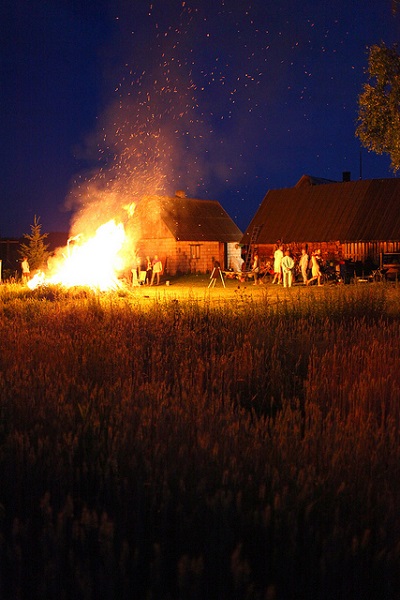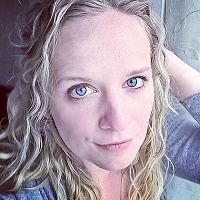As I prepared my farm for St. John’s Eve, I gazed at a blackening sky and worried.
I worried of rain, of wind, of thunder and lightning which threatened the Estonian Midsummer gathering I had planned in my American forest.
I worried of flash floods which could devour the small bridge leading to my home.
I worried of tree-falls and power outages which could endanger my guests.
I worried of disappointment on what should be the most magical night for all Estonians (the fire festival of St. John is one of the biggest holidays celebrated in that Northern nation, my father’s homeland). I worried of discomfort for Estonians who were already several thousand miles from home.
I worried about that faraway homeland, too, and the war drums thumping along its Russian border.
Ukraine is in serious trouble; it has been over one year since Russian troops were first seen crossing its borders (although Russia officially continues to deny an invasion has occurred). Some fear Estonia, which was occupied for a half-century by the Soviet Union, is next on Vladimir Putin’s hit list.
Will Estonia hold the line? Will Estonia’s allies help her? If war comes to that place which I love, that place where dear ones still reside, what will I do? I wondered.
As the blue, black, and white of Estonia’s flag was hoisted over my house, I glared at the clouds imploringly, begging them to spare this space this night:
Let the Estonians have their fire, please! The world is so terrifying right now, and we need this one happy thing so much! I thought.
But my prayers were ignored: the guests arrived, and then the heavens opened.
Oh, how they opened! And here is how it was:
The heavens opened and pelted the ground, kicking up the mud between each blade of grass; but the children went out and scooped it into their paws, and half-laughing, half-roaring, painted themselves as warriors.
The heavens opened and cast down leaves from the crowns of the forest canopy; but the little girls ran out and caught them, and turned them into their own crowns, weaving the greenery into their braids.
The heavens opened and the stereo had to be brought under safe cover of the porch; but young adults ran out dancing into the thick of the deluge, giggling and drinking the rain as if it were wine.
The heavens opened; but somehow, our midsummer fire did not go out.
The storm paused then, as if considering what to do with us.
But the Estonians were ready, and hurried into action. Within moments, the forest was alive with the sound of our old folk music, and the people had hooked arms. In boots or bare feet, they splashed and slipped through the mud of the yard, smiles beaming broadly.
In a rush, the children reclaimed the wild edges of the woods, dashing through fern and mist, shrieking with laughter like proper residents of Neverland.
The fire breathed, hissing with great clouds of smoke; but it did not go out.
But the storm had more to throw at us.
Infuriated thunderclaps shook the earth itself; lightning seared the sky. The Estonians retreated to the relative safety of my wraparound country porch. The storm snarled at them.
And there they stood, laughing.
Drinks were poured, and stories were told. New friends were made and old friends remembered.
I looked out to our fire. It grew lower and lower, smoking quite dreadfully, but it did not go out.
The frustrated storm took another break; again, our party recovered quickly and advanced with coordinated steps.
A number of cars had been parked in a low-lying area, and it was decided that they should be moved before the thickening mud made it impossible to move anything. Already some of the cars were quite stuck, and more rescuers had to be called for from the party.
The gentlemen responded eagerly, rushing down the hill in the light rain. The sodden earth sucked at their legs, pulling more than one aspiring hero down into the muck.
I was terrified that they would be hurt and embarrassed, and maybe even angry.
But they all came back with their heads turned to the drizzling sky, laughing as the rain washed them clean.
Now the storm grew even wilder, whipping the trees into a fearsome dance.
Lights flickered, and a terrible snapping sound broke very close by: a tree toppled somewhere in the woods. At this point everyone took a step back from the edge of the porch.
Now most felt themselves too muddy to go inside, and the storm was too wild to allow people to leave. And I fretted that the Estonians would feel trapped and the party would sour. But souring was not allowed; instead, more seats were brought out onto the porch.
And now when we sat, we were necessarily closer than ever.
It was impossible to not be engaged with one’s neighbors. It was impossible to not be in the middle of at least two conversations at any one time. We all had to talk to and listen to and enjoy one another.
And because we were closer, our talk became closer.
We talked about our own goals, our own doings, our own families. We talked about the ancestors who had endured Soviet times. We talked about the people we had lost—to time, to brutality, to Siberian prison camps—and the people we had found.
And yes: We talked about our fears. We talked about Putin, and what he might have planned for our dear Estonia.
And at some point I glanced over at the fire and saw that it had gone out. But this no longer troubled me.
Because I saw now that something brighter was burning.
The spirit of Midsummer has never depended on that bonfire: we are the fire.
The magic was created by a shared spirit: our community, our togetherness, our dedication to remembering whom we are.
My worries faded and my heart soared, because I understood that this is a fire which no storm can ever steal away.
The fire that saved this Midsummer was the same which had preserved our ancestors through the many long years of occupation and trials unimaginable.
This is the fire passed from person to person, generation to generation, in simple but powerful ways, despite every impossibly evil and inconvenient and undesirable thing rising up against it.
This is the fire that that smolders along quietly inside, even when there is no one to share it with.
This is the fire which remains when everything else is gone.
This is the fire which blazes at countless points around the globe, wherever far-flung members of a diaspora gather together to speak, to sing, to dance, to raise their flag, to remember, perhaps to thumb their noses at their oppressors.
This is a fire which belongs not only to the mere 1.3 million people calling themselves Estonians, but to all people who persevere in knowing themselves; and that is really quite empowering.
This is the fire of self-confidence and the will to survive, no matter what sort of bully one is facing, be it a powerful nation or a slave-driver or a hard-fisted lord of the schoolyard.
This is the fire of endurance, of truth, of connection, of tough-as-nails hope.
I know not what the storm may bring, but it is Midsummer.
Light your fires high.
Author: Katie-Anne Laulumets
Editor: Renée Picard
Photo by Lauri Väin via Flickr











Read 0 comments and reply